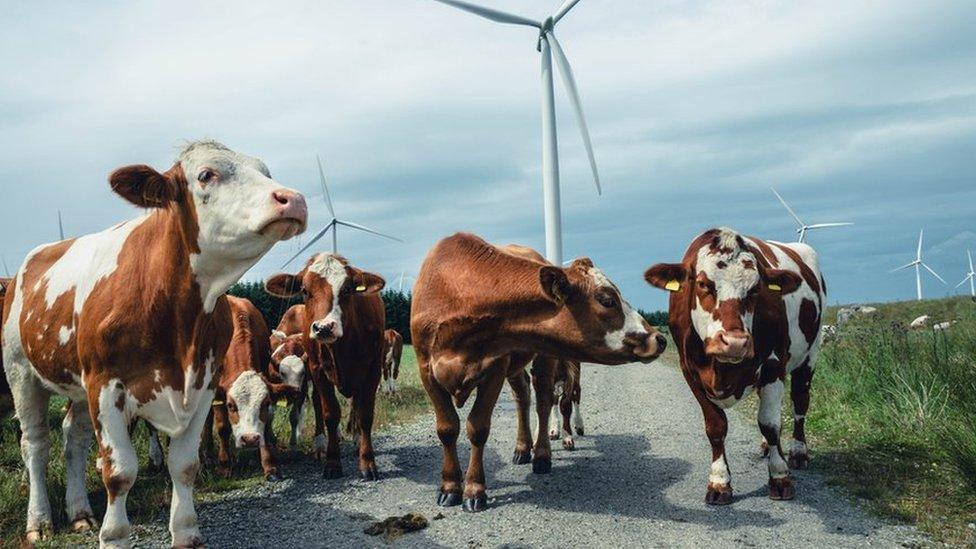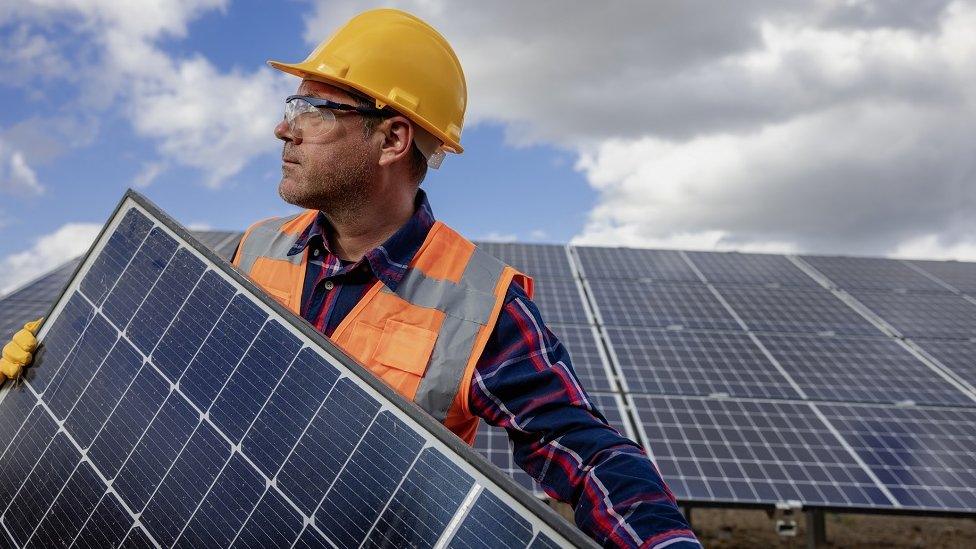Climate change: Business groups want all-island energy strategy
- Published
- comments

The report finds a lack of co-ordination is a significant barrier to progress
Business organisations on both sides of the Irish border have united to call for a refocused all-island approach to energy policy and climate challenges.
The CBI in Northern Ireland and IBEC in the Republic say the countries are at a "major energy crossroads".
They add the restoration of the NI Executive presents opportunities for increased innovation and investment in zero carbon development.
They jointly launched a new report on Tuesday.
In it, they call for policymakers to "develop and pursue a more co-ordinated and ambitious effort" in the transition to net zero.
They also say that transition should be underpinned by "a new phase" in energy collaboration and investment in shared infrastructure.
The Shared Energy Futures report found that a lack of co-ordination was a "significant barrier" to progress in energy and tackling climate change.
It highlighted the "significant chance" presented by the shift to net zero - with enhanced competitiveness, increased energy resilience, job creation and affordability of energy.
But it warned that progress was being impeded by regulatory uncertainty, planning delays, skill shortages, supply chain constraints and risks to energy security.
What does the all-island report say?
It has made a total of six recommendations, including:
Embracing new opportunities for alignment on energy and climate action
Providing greater regulatory and policy certainty for green transition investors
Safeguarding the Single Electricity Market alongside strengthening electricity infrastructure, with a renewed commitment to vital grid projects like the North-South Interconnector.
And it says the gas grid should be supported to decarbonise and become more resilient, with new opportunities in biomethane, hydrogen and carbon capture.
A scoping exercise to be carried out this year will identify the skills gaps and places where supply issues may arise.
Fergal O'Brien, from IBEC, said there was a "real opportunity" for a new phase in all-Ireland co-operation, which he described as a critical component.
"The energy demands, emissions drivers and barriers to decarbonisation are broadly shared across the two islands," he outlined.
"Policymakers face the same difficulties with infrastructure delivery, energy affordability, public buy-in, skills shortages, carbon leakage, and technology readiness.
"An uncoordinated and disjointed approach could see policymakers working against each other, resulting in unnecessary duplication of effort and investment, increased costs, mixed signals for consumers and investors, and missed opportunities for emission reduction."

Angela McGowan said it was important that regulatory divergence did not hinder energy strategy
The director of the CBI in Northern Ireland hoped an end to political uncertainty would mean a period of energy policy predictability and strategic collaboration.
"Northern Ireland's continued participation in the single electricity market, which has delivered proven benefits for consumers across the island, is critical, but collaboration must now go beyond this," said Angela McGowan.
She added that, with a relatively small market, it was in "Northern Ireland's economic interest" to broaden that energy collaboration with both the Republic of Ireland and Great Britain.
"The business community recognises the immense opportunities from increased investment, energy security and job creation.
"However, these can only be realised through collaboration, both north-south and east-west, to ensure that regulatory divergence does not hinder progress."